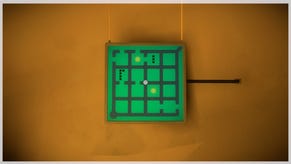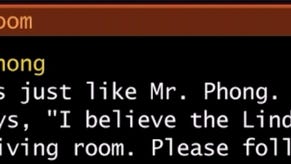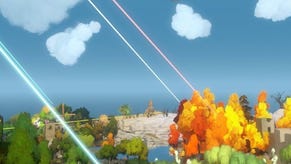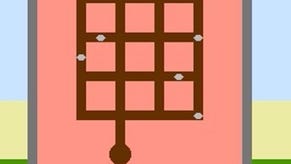Jonathan Blow
"In this game there are hardly any verbsˇ"
No. [Laughs.] We don't find that at all, and that's been an interesting part of the process. I think we're finally starting to come to an understanding. There are things that we care about, right, and these are two things that, in general, architects don't seem to care that much about - and one of them I would have expected they'd think more about.
Thing number one is that I'm encountering this space for the first time, and I'm walking through it: what is my understanding of things and how does that change as I move my viewpoint around? I thought that was something architects spent a lot of time thinking about, but that doesn't seem to be as true as I thought it was, after working with them. I think they tend to think about what something looks like if you were framing it in a picture frame.
On a call the other day, one of the discussions we were having was, "Hey, we'll have these cliffs, and they'll be made out of a certain material, and we'll have these buildings that will reflect the structure of the cliffs, and it will look nice in that picture framey sort of way." But it wasn't about what you see as you walk into the building.
Part two is that we always care very much about the theme of an area, and then we want the fiction of the building to be appropriate to that. They don't tend to think much about that at all, so we have to keep reminding them. But it's been interesting.
I've read a lot of Calvino. I wasn't really going for that here, but I couldn't help but be inspired by it. He's one of my favourite authors. It's inspiration in kind of an indirect way. I never thought of it this way, but he'll definitely combine a concrete manifestation of something with a theme that it echoes. Braid was very definitely inspired by that in quite a clear way. This wasn't, but it might be something that's worked its way into my design technique by this point.
As for the autobiography, I will leave that open to question, but answer it in a different way. You were saying that it feels literary in a certain way. Assuming that that's true, I ascribe that to the intention of the game. Most of the stories in games are what I think of as entertainment stories. That's not what this is. It's more like I'm writing this about issues that I'm concerned with, or things that I think about that seem to be important.
"If you're not doing an entertainment story, that's considered highly weird. It's considered art game."
That's often the way that a novelist will write, and we don't get confused by that when novelists do it. We know there are adventure novels or romance novels, but we have no trouble envisioning a novel that works differently. And the novels that are written with those sort of intentions, we don't think of those as art novels. Art novels are something weird and experimental, like George Perec, right? Or maybe even Calvino sometimes. But it's weird that in games, it's completely the opposite. If you're not doing an entertainment story, that's considered highly weird. It's considered art game. For Braid, at the time, I thought that was a label that really applied, but for this game, I used to think of it as an art game, but now it's not really an art game to me. It's just a game that's what it would be like if I wrote a novel where I really cared about the subject of the novel.
The story has come a long way. The first version of the story was very direct about the themes. Then you'd go and listen to the recordings, and they'd talk about these very abstract ideas, and you'd end up thinking, what does this have to do with anything, and why should I be listening to this?
And then after that, I over-reacted to that, and went way back more in the direction of an entertainment story, and that felt more like giving up and losing. It wasn't what I wanted this game to be. What I found was the best way to speak about the issues I wanted to talk about - issues that are perhaps all encompassing - is to speak about them confined in a way in terms only of things I know directly about. That way it comes across as genuine, and not posturing, and hopefully not lecturing or preachy.








